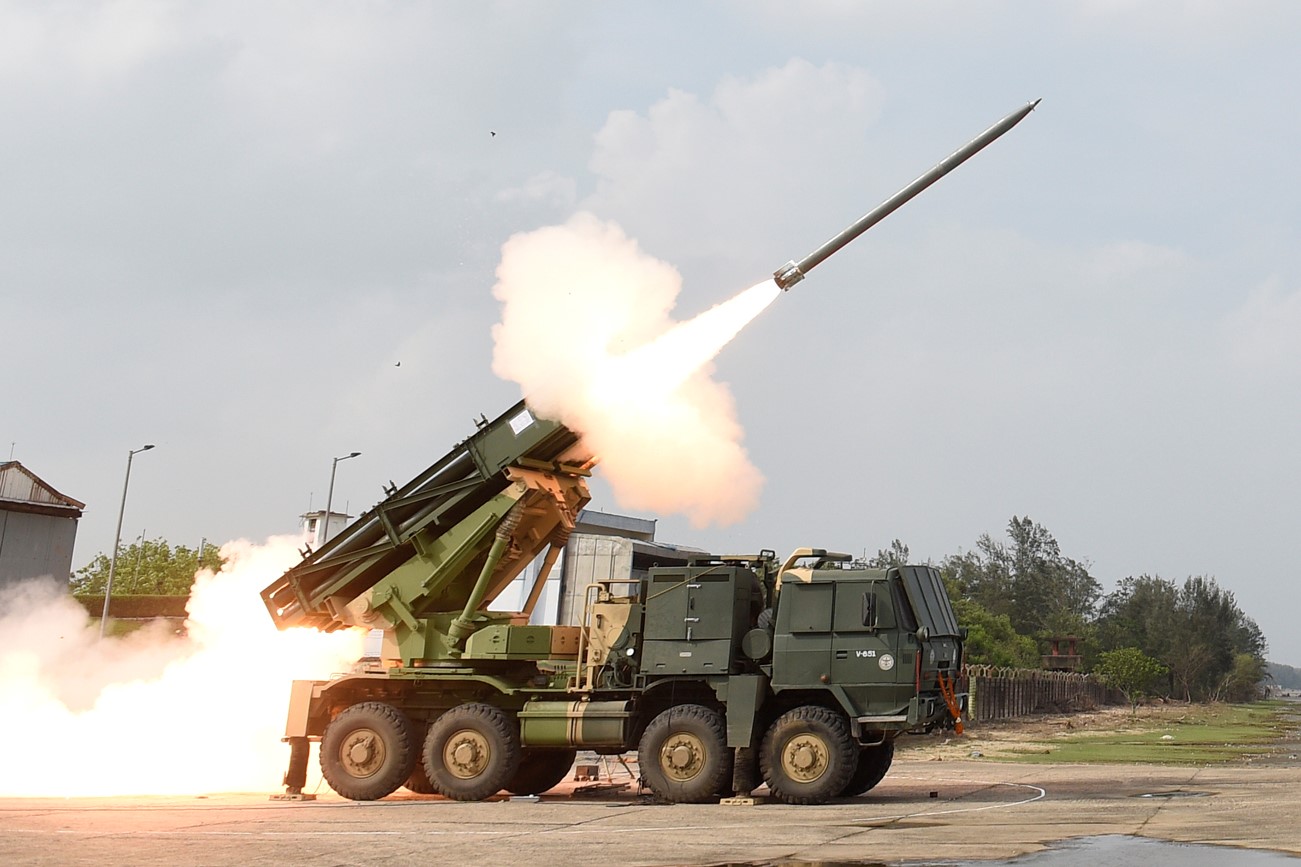Description

Disclaimer: Copyright infringement not intended.
Context
- The Defence Research and Development Organisation (DRDO) is developing Pinaka multi-barrel rocket launchers that would be able to strike targets at 120 km and 200 km.
- Two South American countries have shown interest in the Pinaka multi-barrel rocket launchers.
Details
- The Pinaka is a multiple rocket launcher designed and produced in India by the Defence Research and Development Organisation (DRDO) for the Indian Army.
- Developed to meet the long-range artillery needs, the Pinaka has seen service in critical situations, including the Kargil War, where it successfully neutralized Pakistani positions.
Development
- Initiation (1981):
- In response to the Indian Army's requirement for a long-range artillery system, confidence-building projects were sanctioned in 1981.
- The Army formulated the General Staff Qualitative Requirement (GSQR) for the system in July 1983.
- Mk 1 Development (1986-1992):
- Development started in December 1986 with a budget of ₹26.47 crore.
- Armament Research and Development Establishment (ARDE) led the development.
- The Pinaka was envisioned to replace the Russian BM-21 Grad Launchers.
- Private Sector Involvement (2020):
- Final developmental trials were conducted by the private sector, Solar Industries, in August 2020.
- The move aimed to decrease dependency on external sources.
- Mk 2 Development and Guided Version:
- Pinaka Mk II, developed by ARDE, RCI, and DRDL, features enhanced range and accuracy.
- A guided version, equipped with a navigation kit, underwent successful testing.

Testing and Upgrades
- Testing Timeline:
- Pinaka Mk II was successfully tested at various ranges, including 65 km, 75 km, and an extended range of 90 km.
- Guided Pinaka tests were conducted to improve accuracy.
- Extended Range Testing (2022):
- Extended range version tested in 2022 with a range of up to 90 km.
- The Pinaka Mark 2 completed User Assisted Technical Trial (USTT) in December 2021.
Deployment
- Regiments and Batteries:
- The Pinaka system is organized into regiments, each consisting of three batteries of six launchers.
- A Pinaka battery comprises launcher vehicles, loader-replenishment vehicles, replenishment vehicles, and command post vehicles.
- Operational Flexibility:
- The system offers flexibility in firing modes, including autonomous, stand-alone, remote, and manual modes.
- A fire control computer enables coordinated firing or individual operation by each launcher.
Salient Features
- Technological Advancements:
- Utilizes state-of-the-art technologies for improved combat performance.
- Cabin pressurization and blast shields ensure crew protection.
- Microprocessor-based fully automatic positioning and fire control console.
- Operational Capabilities:
- Night vision devices enhance visibility for the crew.
- Capable of neutralizing troop concentrations, military vehicles, and enemy gun/rocket locations.
Orders and Future Plans
- Regiment Expansion (2020):
- Orders for additional regiments were signed in 2020, with BEML, Tata Power SED, and Larsen & Toubro involved in the contract.
- Deployment plans include 16 regiments by 2022, with a potential increase to 22 regiments in the future.
- Future Improvements (Trajectory Correction System):
- Collaboration with Israel Military Industries to implement Trajectory Correction System (TCS) for improved accuracy.
- Armenia Deal (2023):
- Armenia signed a deal worth ₹2,000 crore for Pinaka batteries and other defense equipment.
- The order included extended range and guided rockets for the Pinaka system.
- Global Interest:
- Indonesia and Nigeria have expressed interest in the Pinaka multi-barrel rocket launcher.
Pinaka Variants
- Pinaka Mk-I:
- Range:5 km
- Warhead Weight: 100 kg
- Launcher: Based on a Kolos Tatra truck for high mobility, featuring a central type regulation system.
- Pinaka ADM (Area Denial Munition):
- Range: 60 km
- Warhead Weight: 100 kg + additional 15 kg for guidance, navigation, and control kit
- Rocket Weight: 325 kg
- Rate of Fire: 40 rockets in 20 seconds
- Pinaka Mk-II:
- Range: 45 km
- Guidance: Free flight
- Pinaka Mk-I Enhanced:
- Range: 75 km
- Guidance: Free flight
- Guided Pinaka:
- Range: 40 km
- Guidance: Free flight
- Launcher: Fixed cluster of 40 rockets
- Extended Range Pinaka (Pinaka ER 122):
- Range: 90 km
- Status (as of December 2023): Under trials.
- Launcher: Under testing.
- Pinaka Mk-II ER:
- Range: 120 km
- Status (as of December 2023): Under development.
- Pinaka Mk-III:
- Status (as of December 2023): Under development.
- Pinaka Mk-III ER:
- Range: 200 km
- Status (as of December 2023): Under development.

Conclusion
The Pinaka multiple rocket launcher stands as a testament to successful indigenous defense development in India. Its continuous testing, upgrades, and deployment signify its importance in the Indian Army's artillery arsenal. The interest from other countries underscores its potential as a reliable export product, showcasing India's capabilities in the defense manufacturing sector.
MUST READ ARTICLES:
https://www.iasgyan.in/blogs/the-basics-of-missiles
https://www.iasgyan.in/blogs/indian-missiles-an-overview
|
PRACTICE QUESTION
Q. What is the purpose of the Pinaka Area Denial Munition (ADM)?
A) Anti-aircraft defense
B) Neutralizing enemy tanks
C) Denying access to a specific area
D) Electronic warfare
Answer: C)
|
















